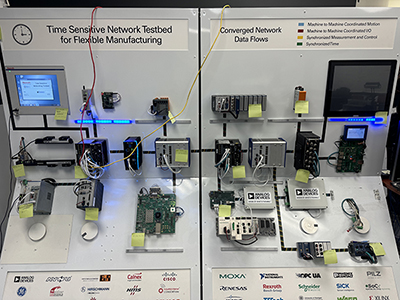Research Challenges in TSN
While TSN is built upon well-defined standards, these standards expose many configuration options that allow network engineers to maximize the potential of their networks. Unfortunately, this flexibility can also lead to significant interoperability challenges, especially among devices developed by different manufacturers. New analytical tools and technologies are needed that enable seamless network configuration, especially among diverse devices, while preserving real-time predictability and the required quality of service required by end devices and users. Furthermore, model-based tools and middleware are needed to raise the level of abstraction for software development with TSN as the messaging layer.
Dependability and Security must also be considered in this domain. These issues are becoming increasingly critical with the convergence of Information Technology (IT) and Operational Technology (OT). New defensive technologies and architectures are needed to assure that malicious users or devices cannot compromise the reliability or real-time guarantees provided by TSN. This is an important dual goal in any technology that allows for network reconfiguration or dynamic behavior, as it is critical that such mechanisms cannot be harnessed by attackers for malicious effects.

The TSN Testbed

The Institute for Software-Integrated Systems at Vanderbilt University, along with the University of Stuttgart, host the only two IIC TSN testbeds. The goal of these testbeds is to provide a facility where users and industry partners can test their TSN devices for compatibility and interoperability with TSN devices from other manufacturers.
The core topology of the testbed consists of a set of switches and high-precision measurement devices. During “plugfests,” participants attach their own devices to the testbed and high-precision testing is done across all devices using various types of network traffic. The University of Stuttgart hosts plugfests approximately 2-3 times per year, and Vanderbilt will begin holding plugfests in the coming months. Participation is free, and IIC membership is not required.
Projects using TSN
Researchers involved in the research
• Daniel Balasubramanian (Project Lead)
• Anirüddhā Gokhālé
• Bryan C. Ward
• Gabor Karsai

